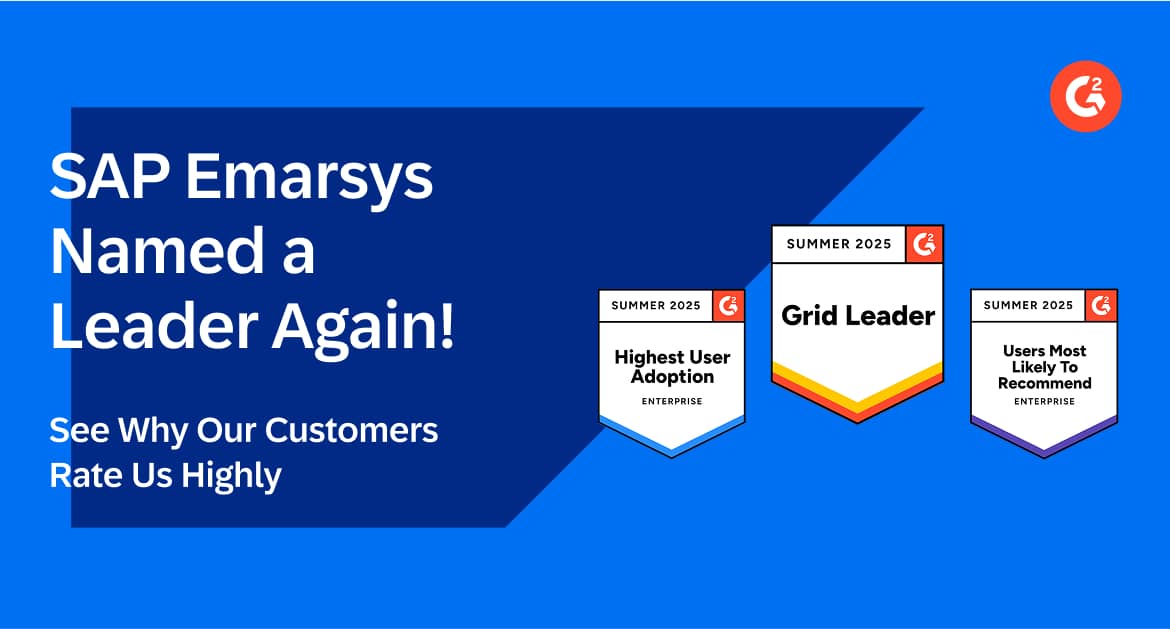You can’t attend a marketing event or open your favorite marketing insights newsletter without reading about AI. Is it hype? Or is it the future? Are fears about it well-founded?
Whatever you think about it, there is no denying that the integration of AI into marketing strategies represents one of the most significant shifts for marketers in recent years, and it’s poised to be with us for a long time. New SAP Emarsys research has found a marked rise in consumer demand for AI in ecommerce. Data shows that 64% of shoppers think artificial intelligence has improved their retail experiences. This is up from 51% in 2023.
Far from making marketing impersonal, as some believe, AI is giving marketers new capacity to understand and delight their prospects and customers, as well as enabling marketers to work smarter and faster. AI allows for more personalized and data-driven campaigns, which means that each customer can feel more understood and valued for their unique needs and wants. Predictive AI allows marketers to tailor experiences for customers, making them feel more understood and serving their unique needs and wants.
From the workflow perspective, AI empowers marketers with predictive and generative AI tools seamlessly integrated into key processes, reduing hte need for manual work. AI can enable faster and more precise segmentation, content creation, personalization, omnichannel delivery and decision making with AI-powered tools. According to SAP Emarsys research, almost three quarters of U.S marketers have increased their investment in AI in 2024. Whether your company is part of that demographic, or your team is still assessing how AI can work for you, in this blog post, we will delve into how AI impacts marketing. We’ll focus on generative and predictive AI and how marketers are leveraging these technologies to enhance their marketing strategies.
Demystifying AI – What is AI, Really?
Understanding AI in marketing is crucial for marketers looking to stay competitive in an increasingly data-driven world. AI involves training machines to process information in ways that help them generate new information and predict behavior based on vast data sets. These could include website visits, customer interactions, purchase behavior, social media sentiment, and preferences shared by customers in apps or in other formats. By processing and interpreting this data, AI enables marketers to extract insights, identify patterns, and make informed decisions to optimize marketing strategies. Generative AI allows for faster creation of marketing messaging, including email content, subject lines, and other messaging. Whether it is understanding consumer behavior, predicting when and why customers drop out of the buying cycle, or recommending products based on customers’ purchase history, AI empowers marketers to navigate today’s marketing landscape with precision and efficiency and helps delight users with more relevant and timely information. Of the nearly three quarters of marketers who have increased their investment in artificial intelligence, 78% attribute a boost in customer engagement to AI, while 75% report a boost in customer loyalty.
Generative AI
If you have played around with some of the popular AI-powered tools recently, chances are you’re already familiar with generative AI. If you have heard about “computers writing books” and some of the other things bandied about in the media, that’s generative AI, too. Generative AI, basically, is artificial intelligence that can create things, such as text, images, or videos. It learns from a vast multimodal database that includes text, images, and video and then creates new, coherent, and contextually relevant text based on that learning. To get good outputs from generative AI, marketers need to become adept at natural language prompts, baseline instructions, and specify creativity and language preferences. Successful use of generative AI requires understanding AI model interpretations, experimenting with various prompt styles and formats, and continuously refining these to improve response quality and relevance.
Large Language Models (LLMs) are one facet of generative AI and represent a significant advancement in natural language processing. They enable machines to understand and generate human-like text with accuracy. One large language model many marketers are aware of, or may even use, is OpenAI’s GPT-3. Large language models are trained on vast amounts of text data (to the tune of billions of bits of data). They are trained to understand contextual relationships so they can generate coherent and relevant responses.
Generative AI can be a game-changer for marketers. It allows them to produce fresh, engaging content at scale, reducing the time and resources traditionally required. Generative AI can generate ad copy tailored to specific audience segments, create personalized content, and jumpstart marketers’ own creativity.
Predictive AI
An AI that has been around for far longer without as much fanfare as generative AI is predictive AI. Emarsys has been using predictive AI in its platform for over a decade. Our Customer Intelligence (Smart Insights) module with RFM modeling was released in 2013 to empower marketers to measure and drive CTLV. The Predict Engine launched in 2014 to scale personalized product recommendations and content via email, web, and mobile. Since then, we’ve been hard at work continually optimizing and introducing new features… and we’re nowhere near done yet.
Predictive AI involves systems that analyze historical data to forecast future events. For example, in e-commerce, predictive AI can forecast customer purchasing behavior based on past shopping patterns. This technology involves using advanced algorithms to analyze historical data and identify patterns that can predict future outcomes. Predictive AI can help marketers understand which products or services customers are likely to be interested in, allowing for more targeted and personalized marketing efforts. They can learn how long customers usually take between refills of a product, and tailor recommendations accordingly. They can pinpoint friction in the buying cycle by analyzing at what point customers drop off and reduce it.
Additionally, predictive AI can optimize audience targeting by identifying the most effective channels, messaging, and timing to reach potential customers.
What’s in Store for AI in Marketing?
AI is not the future… it is now. As AI algorithms get increasingly sophisticated, however, marketers will be able to extract ever-deeper insights from data and make more accurate predictions about consumer behavior. As AI continues to evolve, we can expect to see advancements in areas such as predictive analytics and content generation. The rise of AI-driven automation will streamline marketing workflows, allowing marketers to focus on strategic and creative tasks.
Challenges and Ethical Considerations
It is hard to discuss AI without consideration of the ethics surrounding it. As with all new technology, its implications are still being understood. Data privacy concerns are one concern that is brought up when using information to teach AI systems about customer behavior to leverage AI for personalized marketing campaigns. With increasing scrutiny over how companies collect, store, and use customer data, it is critical to respect consumers’ privacy rights when delivering personalized campaigns. This entails being transparent about data collection practices, obtaining explicit consent from users, and adhering to regulations such as the EU (European Union) AI Act, GDPR (Global Data Protection Regulation) and CCPA (California Consumer Privacy Act).
Additionally, overreliance on AI can lead to a loss of human oversight and intervention in decision-making processes. While AI can automate many tasks and processes, it cannot replace human judgment, creativity, and empathy. By maintaining a human-centered approach to AI, marketers can harness its full potential while minimizing the risks associated with overreliance.
Want to know more?
If you are looking to learn more about the exciting implications of AI to make marketing smarter, faster, and more intuitive, watch the replay of our Omnichannel and AI Masterclass. New AI capabilities of the Emarsys platform were unveiled during the event. Additionally, you can learn how marketers are breaking down data silos, connecting data, and using AI to scale growth and delight customers. Discover what it takes to cultivate true customer loyalty by investing in technology, people, and processes to create experiences that foster customers for generations.











